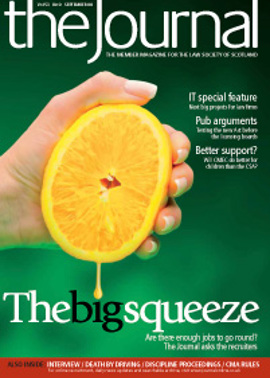Another hoop to jump

Members of the profession are alerted to the fact that the Council of Mortgage Lenders (CML) have introduced a significant change to the CML Lenders’ Handbook for Scotland, effective from 1 September 2008.
CML advises that the change is to help restore confidence in the new-build market. The difficulties in capturing discounts and incentives offered on new-build properties have led to price distortions and exposed lenders and the public to fraud and the risk of loss. This is now impacting on builders and prospective purchasers due to the harder line lenders are taking to avoid hidden risks, and the whole market is suffering.
Additional duty
From 1 September 2008, therefore, lenders will enhance their instructions in part 2 of the Lenders’ Handbook. These changes will require solicitors to confirm that they have received a new “disclosure of incentives” form from the builder/developer of any new-build, converted or renovated property, before submitting their certificate of title. CML hopes that the form and associated changes to the CML Lenders’ Handbook for Scotland will achieve a greater transparency in a way that is as simple as possible. A copy of the disclosure of incentives form and a frequently asked questions document can be found at www.cml.org.uk/handbook/frontpage.aspx .
The Law Society of Scotland fully supports the principle of combating mortgage fraud. However, the members of the Society’s Conveyancing Committee have grave concerns about the practicalities and potential difficulties for solicitors which the new procedures will cause. In our view, the new process fails to take adequate account of the way the Scottish market operates. We have voiced our concerns to CML, and we are disappointed that our concerns have not been taken on board. We will continue to engage with CML to seek to secure a workable solution that addresses all concerns.
Approval before missives
However, since CML has now indicated that it will be proceeding with its proposed changes to the handbook despite our concerns, we offer the following advice to the profession:
When you send a completed certificate of title after 1 September in respect of a newly built or newly converted property, you will be confirming that you are in receipt of a completed CML disclosure of incentives form from the developer/seller’s solicitor which complies with your loan instructions. It is intended that the disclosure of incentives form will be supplied by the developer’s solicitor along with the proforma missive.
The disclosure of incentives form will be of material significance to the valuation process. It will contain far more information about incentives and the intended beneficiary of the transaction than is presently the case or would ordinarily be known to the purchaser’s solicitor. The present CML rules require solicitors to disclose any incentives provided for in the missives. The new disclosure requirements will seek information regarding, inter alia, the density of units on the site; the number of bulk purchasers; access to “luxury” or non-standard shared amenities; and payment of introductory or finders’ fees. None of these items would ordinarily be within the purchaser’s solicitor’s knowledge, and are therefore incapable of verification by the purchaser’s solicitor.
It is also important to note that, post-1 September, when you submit your certificate on title, you will be deemed to be confirming that not only have you received a completed CML disclosure of incentives form, but that the form which you have received complies with your loan instructions. The FAQs also state that you should confirm with the purchaser/borrower that the information on the form received is correct. Given (a) that the form deals with cash and non-cash incentives and is primarily a tool for the lender to use in deciding how much to lend; (b) the variety of information to be disclosed in terms of the form; (c) the fact that each lender may interpret the information given in the form in a different way; and (d) that the form will be produced prior to the missive stage and ordinarily prior to any loan instructions being issued, we fail to see how any reasonably competent solicitor, on perusal of the form alone, could determine without specific input from the lender whether the form will comply with the (yet-to-be-issued) loan instructions.
In the ordinary case, we feel that a solicitor has a duty of care to the lender to prepare proper and effective security documentation, but we do not believe that a solicitor has a duty to verify the value of the security subjects. So in all new-build cases where the purchaser will be seeking mortgage funding, our advice is that a copy of the form should be sent to the lender as soon as received and the lender’s specific approval thereof sought before missives are concluded. Failure to seek approval prior to concluding missives on an each-and-every-case basis where a loan is involved could leave the solicitor exposed to a claim in the event that the loan instructions, when issued, do not take into account the terms of the form as delivered to the solicitor.
Delay factor
We appreciate that not all purchasers of new-build properties will have firm offers of finance in place when they reserve a new-build property. However, if the solicitor is to ensure that the lender’s approval of the form as issued has been obtained prior to conclusion of missives, then prospective purchasers will have to arrange their finance in advance of concluding missives.
Inevitably, the new disclosure requirements will result in significant delays in the process of purchasing a new-build property while the CML disclosure of incentives form is approved by the lender. Solicitors and their clients are reminded that these new procedures are being put in place by CML to restore lenders’ confidence in this particular sector of the market. CML has indicated the support of Homes for Scotland for its initiative, so perhaps it can be anticipated that builders will extend their usual reservation periods to allow prospective purchasers sufficient opportunity to have their loan arrangements approved in the light of the particular disclosures in each particular case?
Under review
We believe that the aims of CML could have been addressed in a simpler, more efficient and transparent way by insisting that the disclosure information be, and remain, entirely a valuation matter, addressed by the lender’s surveyor. However, CML feels that the solicitor must be involved in the process. CML has indicated that it will review how the new procedures are operating in practice in the first half of 2009. If therefore any member experiences any difficulty with the new arrangements, we would ask that they provide details (anonymised, if necessary) to James Ness, Deputy Director of Professional Practice at the Society.
Until we have seen how the new arrangements work in practice, however, we will continue to recommend that missives for new-build properties should not be concluded unless and until the lender of choice has confirmed its approval of the CML disclosure of incentives form in each particular case. Solicitors are reminded:
(i) it is not their function to usurp the role of the lender in making the lending decision;
(ii) that there is no general duty on a solicitor acting for a lender to verify the value of the security; but
(iii) all information supplied by the builder’s solicitor to the lender’s solicitor upon which the lending decision might be based should be passed on receipt to the lender;
(iv) very few lenders actually permit non-disclosure of incentives below 5% of the purchase price. Those who do operate this exception only allow it in the first purchase of new-build property. It does not generally apply with secondhand property and therefore, as a general rule, all incentives require to be reported to the lender.
Clearly, only actual disclosure to (followed by approval by) the lender of the information contained within the CML disclosure of incentives form will fully protect the solicitor from subsequent claims.
In this issue
- Discrimination is discrimination
- Servitudes and shop fronts
- DLA Piper in expansion mode
- At your service
- ARTL and secure signatures
- Sending a unified message
- Facing the squeeze
- Room for doubt
- Dealing with our older casework
- Regime change
- Risky business
- Drink problems
- Consumer credit licence changes
- RFPG's online trainee service
- Adult incapacity: new caution scheme agreed
- Appreciation: Sandy McIlwain
- Stair Memorial marks its 21st
- "Gateway" opens its doors
- Facing the lean years
- On the road again
- E-legal @ Nothing but the Net
- IT - ever onwards
- Testing competency
- A Wise decision
- Name calling
- Diverse guidance
- Tackling the sporting bodies
- Keeping it legal
- Scottish Solicitors' Discipline Tribunal
- Website reviews
- Book reviews
- Charging the death offences
- Another hoop to jump
- An idea whose time has gone
- Society launches home report solution






